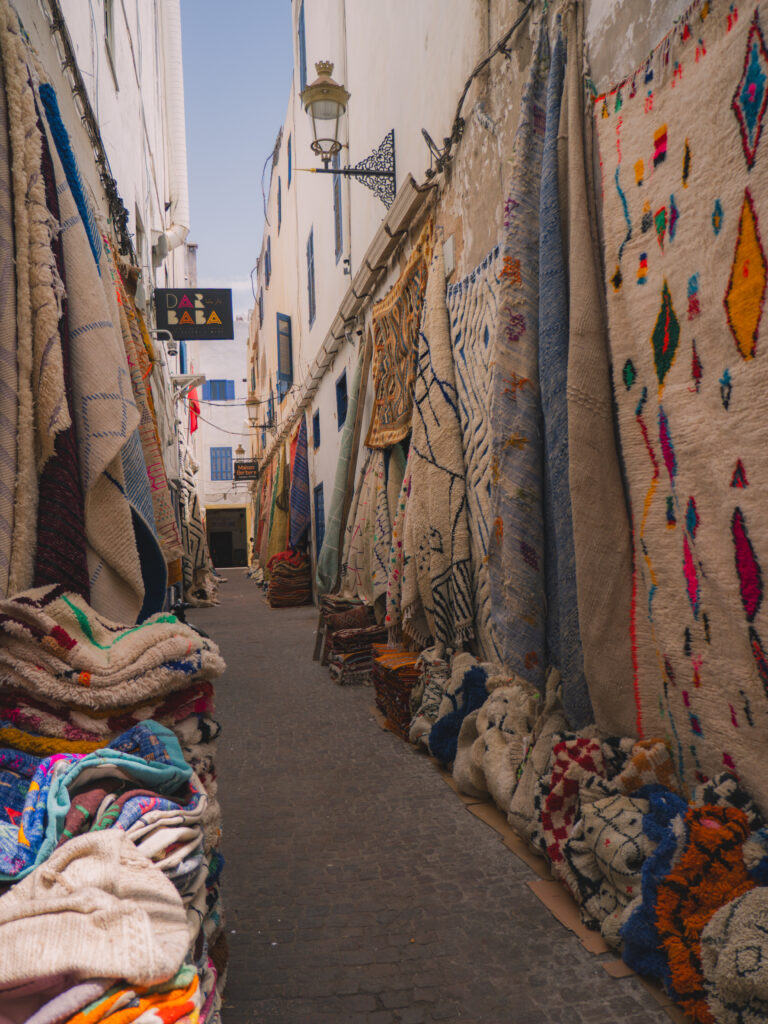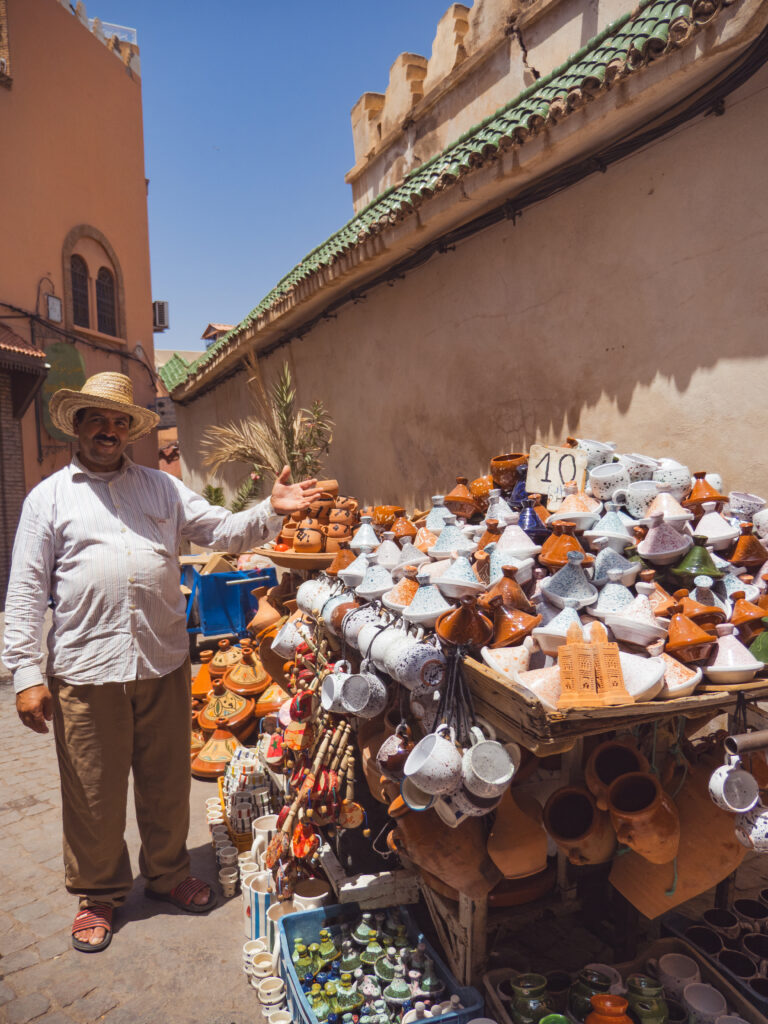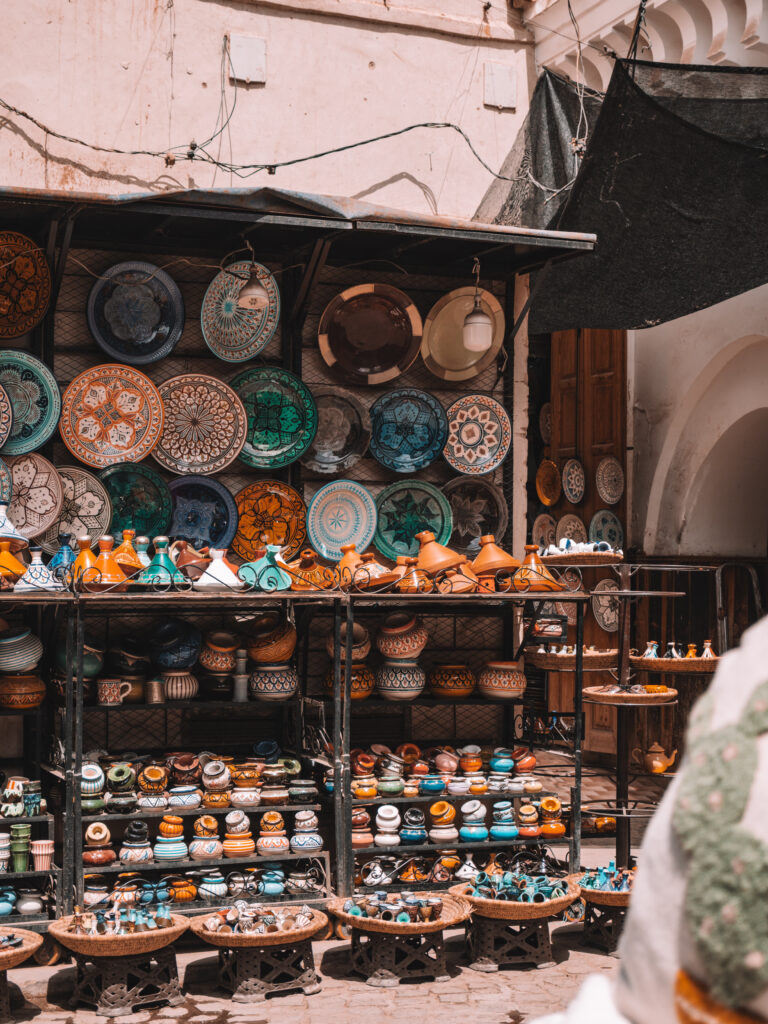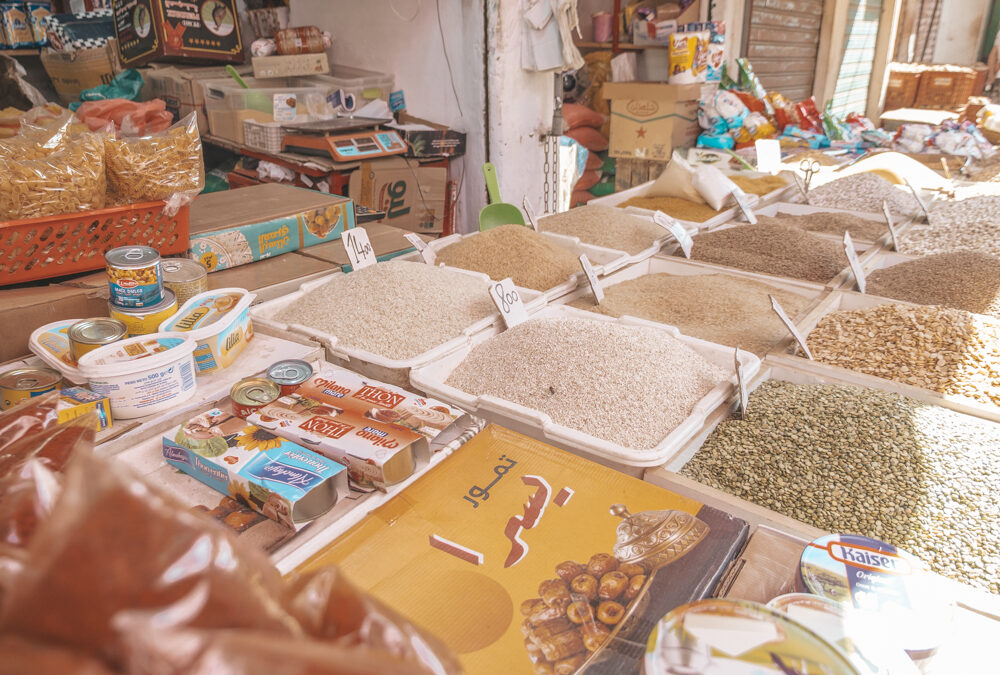If you have ever wandered through the lively souks of Marrakesh, Fez, or perhaps Essaouira, you will know that shopping in Morocco is much more than simply choosing an item and paying for it. There is an entire ritual of haggling involved. But how does haggling in Morocco actually work? And should you, as a tourist, really haggle even if you can afford to pay the full asking price?
At first it might feel a little awkward for Western visitors, but with some understanding, respect, and a touch of humour, haggling quickly becomes fun. It is part of the experience of getting the best price. Even as a tourist, it is important to participate in this cultural practice.
Why do they haggle in Morocco?
In many Western countries, we are used to fixed prices. Prices are clearly displayed, and deviating from them feels impolite or inappropriate. In Morocco, it is different. Haggling is common and even expected. It is a way to create social contact, show appreciation for the products and the craftsmanship, and find a fair price that satisfies both parties.

Although mass production is becoming more widespread in Morocco, you’ll still find plenty of authentic shops selling handmade goods. Many of these shops have been passed down through families for generations, with skills handed from parents to children. That means sellers can set their own prices. In the Netherlands, the equivalent might be flea markets, where people sell homemade or second-hand items at prices they choose themselves; sometimes with a tag, often open to offers or bundle deals.
The social aspect: More than money
For many Moroccan shopkeepers, the haggling process is part of their daily life and not necessarily a hard battle for profit. It is also simply a game and a way to connect with people. You may be offered tea, start a conversation about your trip, and learn more about the origin of the product. Sometimes the conversation lasts longer than the haggling itself, and that is exactly what makes it so enjoyable.
I even once had a long conversation while buying a simple sunscreen about how some people only want to be friends if you have money, but that you should judge people by their personality and not by how much money they have. I honestly have no idea how the topic came up, but it was a friendly chat and I think he mainly enjoyed talking to someone.
Most Moroccans are very social and curious. If you pay attention, you will also see them constantly visiting each other, joking, and drinking tea. That is simply the culture, not a sales trick. Many shopkeepers are proud of their craft and like to explain how something was made, how long it took, or which materials were used. Show interest. Even if you ultimately buy nothing, that is appreciated.
I can afford the full price, do I still have to haggle?
It is perfectly understandable to think, “They could use the money more than I can, so I will just pay the full price.” But be aware that this can cause problems.
Haggling is part of many cultures and is a daily ritual with the locals. The opening price is therefore always much higher than what they actually expect to get. Tourists are often quoted higher starting prices than locals, so even the best haggler will probably still pay more than a local. But ultimately, this is how they earn a living. If they see that a tourist is willing to pay €50 without haggling while locals haggle it down to €10, they will prefer to sell to the tourists. Two tourists then equal ten locals. Or they may refuse to go below €20. This can make daily products significantly more expensive for locals because tourists do not want to haggle. Sometimes there is a strong sense of community, and this does not happen as much, but ultimately, people want to earn money. If the income difference between tourist and local prices becomes too large, the local ends up paying the price.

As I mentioned before, they will raise the price for tourists anyway. They assume that you cannot judge the value, and usually they are right. But if you manage, after haggling, to pay €25, that is only 2.5 times what a local would pay, not five times. If you do not haggle at all, they may think “my prices are too low, I will raise them,” and that becomes a problem.
Of course, you can choose not to haggle for tourist items. The chance that a local buys an “I love Marrakesh” sweater is very small. So if you want to pay the full price for that, the seller has a good day. But if you buy shoes, a nice lamp, or a set of plates, these are items that locals also need. Haggling is really important for those. Keep in mind that as a tourist, you will still pay more, but at least you respect the culture and do not disrupt it.
Be aware: if there is a price tag, that means it’s a fixed price, and trying to haggle is rude.
The golden rules for haggling in Morocco
1. Be respectful, not aggressive
Although haggling in Morocco is common, it is important not to be rude or condescending. If a seller asks 400 dirhams (€40) for an item, don’t just offer 50 (€5). Preferably, offer something more realistic, like 150, and find a good middle ground from there. A realistic margin is that you end up between 50 and 70 % of the asking price.
2. Decide the value for you up front
A good rule of thumb: decide before you start haggling what you are willing to pay. If the item is worth €20 to you, then you want to end up around 200 dirhams. Keep in mind that the first price is usually high, sometimes even three to four times the final price. But if you secretly thought you could pay €10 while the seller asks €100, it is fine to politely indicate that it is not in your budget.
I once wanted to buy a small storage box about the size of a palm. I thought a few euros, so when the seller asked “what do you want to give?” I offered 50 dirhams (€5). The seller asked 1160 dirhams (€116) because it turned out to be solid silver priced by weight. I said politely that it didn’t have that value for me and that we probably wouldn’t reach a price that felt right for the both of us. We still had a pleasant chat about his unique shop and then said goodbye.
This kind of conversation is normal in Morocco. As long as you show respect and do not try to get something for free, there is rarely an awkward situation.
3. Be prepared to walk
If the seller won’t meet you halfway, it’s time to leave. This is a strategy, and often they call you back with a final offer. Sometimes not. If they really do not want to lower the price, they’ll let you walk. Be genuinely willing to walk away if you use this tactic. Many items are sold in multiple shops, so you can try elsewhere. But if you found something unique, understand that you might really leave it. You can always return, but then they will probably raise the price because they know you really want it.
How to haggle in Morocco? Step by step guide
Step 1: Let them name their price first
If you show interest, many sellers will ask: “How much would you like to pay?” or “Give me your best price.” This may seem like an opportunity, but it is smarter to first hear their price. If you make the opening offer without knowing the value, you risk already being above their minimum price. Let them start the game, and you may get a lower price than expected.
Tip: If you must make an opening offer, you can make it ironic. Joke “€5” for a real leather bag that you know is expensive. This breaks the ice but leaves the realistic first offer with them.
Step 2: Make a counter offer
Make an offer well below your desired price. For example, if they ask €100 for the leather bag and you want to pay a maximum of €75, start at €40. It may seem like a big difference and may feel like an insult, but you will go back and forth a few times. They might say €90, you offer €55, they say €80, you offer €65, and then you probably end up at €75. You can also try smaller increments and maybe settle at €65.
It is ultimately trial and error. You’ll notice if they are offended because there is no counteroffer. Then adjust and offer a bit higher.
Step 3: Keep an eye on your desired price
Haggling is not a competition to pay the absolute lowest amount. You win if both you and the seller are happy. Decide beforehand what the product is worth to you. If you reach that value, do not be too stubborn. Are those last few euros really worth walking away? Or is the souvenir and experience worth the small extra amount? It is fine if you have a maximum in mind and give up if you cannot reach it.
Step 4: Close the deal
A negotiation can last a long time and involve several rounds. It ends either by accepting an offer or stopping if you cannot agree on a good price. You can agree at any moment or continue until the seller refuses to lower further. Then you can try walking away, hoping the price drops. If the amounts are very far apart, it may feel offensive. Then it is best to politely end the negotiation and indicate that the item simply does not have that value for you. This is more polite than leaving abruptly.
Example where walking away worked:
I wanted a towel and saw a price of 50 dirhams (€5). A bargain, I thought. I chose a colour and asked “50 dirhams, right?” because price tags indicate a fixed price. She said “No, that is for this” and took a small piece of cloth from a pile. On that rack with ten different types of towels, one mini pile had the sign. I felt misled and immediately said I expected €5. I was willing to haggle, but the 600 dirhams (€60) she asked was far from my expectation. Because I felt misled, I was ready to walk away and stubbornly stick to my price. She remained at 300 dirhams (€30) and I at 150 (€15) so I left. She eventually called me back for 150 dirhams (€15). I wasn’t very happy as I felt scammed either way, but it was clear she also didn’t like meeting someone who didn’t take her bullshit. I then saw the same trick in multiple shops and didn’t feel guilty about sticking with my low price. So be careful, but you can also use it to your advantage.
What prices can you haggle in Morocco?
Haggling is really a sport and applied to almost everything. The only rule is that when there are fixed prices, that is the price. That is mainly in restaurants and sometimes in shops. Accommodation booked through a booking platform gives a fixed price, but even if you walk in last minute or someone gives you a phone number of someone they stayed with, there is room for negotiation. Last minute they are happy to rent the room, so they are open to haggling.
For taxis, you can negotiate a fixed price or ask to go by meter. Apps like Uber exist but are not legal, so there is a risk of problems and possibly a visit to a local police station. Use regular taxis and research how much to haggle. Accommodation knows the price, but often tries to sell expensive transport deals. Take it with a pinch of salt and check prices online, or go safely with the meter.
Does the price differ per product category?

Not really. I’m sure there are rules for haggling in Morocco itself. But as a tourist, it is already a long process to negotiate. Aim for between 50 and 70 per cent of the asking price. The only rule is that displayed prices (on signs) are fixed.
Note: If something is truly handmade or made from valuable materials (such as silver, naturally dyed, or from a specific region), the margin is often lower. And rightly so — quality costs money.
What if you don’t feel like haggling in Morocco?
Not everyone likes haggling. Luckily, there are alternatives that can help:
- Fixed price shops: In cities like Marrakesh or Fez you also find shops with “prix fixe”. You may pay slightly more, but you get clear prices and no games.
- Online check: Quickly checking on your phone what something is roughly worth can help manage expectations.
- Book a “shopping tour”: You can hire someone to go through the souks with you. You tell them what you want and your price, and they do the haggling for you. You also give someone an income while respecting the culture and getting products for your desired price. They can also tell you if prices are realistic.
- Or join this G Adventures markets & mountains group tour, where you’ll be surrounded by other travellers and your guide to help you with your negotiations.

